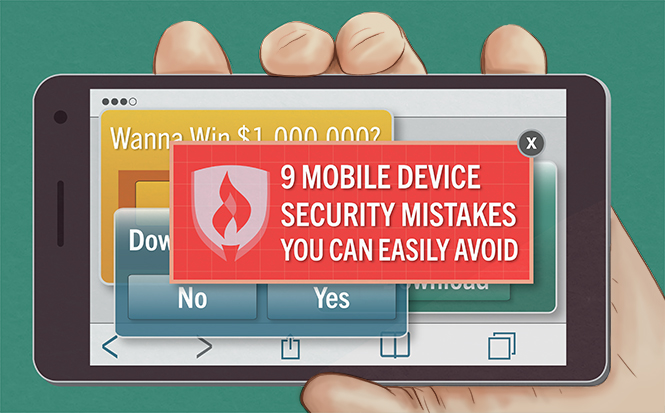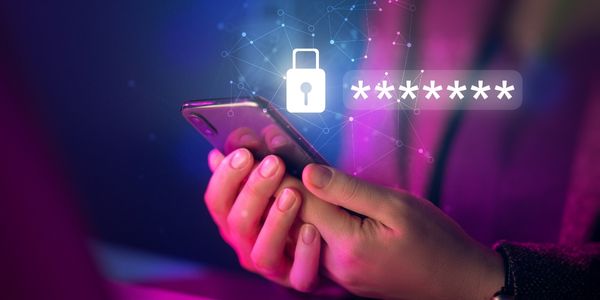
Mobile devices are your lifeline as you juggle your full-time job and manage your family’s schedule. You don’t know what you’d do without your smartphone to give you directions to your son’s baseball game or the cooking app on your tablet that makes dinnertime a breeze.
But there’s a downside to using your smartphone as your personal assistant—mobile device security threats! As smartphone and tablet use is on the rise, so are hackers’ attacks on mobile devices. Internet crime used to be focused on Windows computers, but Android devices have caught up in terms of cybercrime rates, according to Marius Milcher, head of development at Decibel Technology. He adds that Apple devices aren’t immune to hackers, either.
"Mobile devices are not designed with security in mind. They are designed for ease of use."
Smartphones and other mobile devices are susceptible to a number of security threats, leaving your data, your identity and even your money vulnerable to cybercriminals. “Mobile devices are not designed with security in mind. They are designed for ease of use,” says Jeffrey Bernstein, Managing Director of T&M Protection Resources.
Maintaining your privacy doesn’t have to mean giving up the mobile devices that help you manage your daily life. You can keep yourself and your family protected from data thieves by avoiding some common mobile device security mistakes. Stay one step ahead of hackers with these security tips from technology experts.
9 mobile device security threats to avoid
1. Free WiFi
Nearly every coffee shop, airport and even some doctors’ offices have free WiFi these days. But these public Internet connections are “prime territory for hackers looking to steal your personal information,” says Jim Lastinger, CEO at VPN provider Ghost Path.
While you’re browsing the web and sipping your latte, the guy two tables over could be tracking your every move, gaining access to passwords and other important data. Lastinger recommends protecting yourself by using a virtual private network (VPN) app to encrypt the data going to and from your device.
2. Downloading untrustworthy apps
Apps create the perfect disguise for hackers to place malware or spyware on your mobile device. Edward Kiledjian, chief information security officer at Bombardier Aerospace, shares some tips for downloading new apps:
- Verify the number of ratings an app has received, as well as any complaints from previous users.
- Only download from reputable app stores and research the developer to ensure they’re trustworthy.
- Familiarize yourself with the app’s security features before downloading it.
3. Unprotected mobile banking
The rise of mobile banking means it’s easier than ever for hackers to access your bank accounts. Anti-virus and anti-malware software as well as password management software are essential to keeping your personal information out of the hands of cybercriminals, according to Darren Guccione, CEO and co-founder of Keeper, Inc. He advises you to also keep a vigilant eye out for phishing scams—a fake site that imitates your bank’s website to capture your account number and password.
4. Ransomware
The newest threat to mobile devices is Ransomware. This specialized malware locks you out of your device until you pay the malware developer a fee to regain access.
To combat Ransomware, make sure you run automatic backup software regularly and never click on links from people you don’t know, says David Coher, principle of reliability and cybersecurity for Southern California Edison.
5. Jailbreaking your mobile device
Many mobile device manufacturers include restrictions, called Digital Rights Management (DRM), on their products. Some mobile device users bypass these DRMs by “jailbreaking” their mobile devices so they can make personalized modifications or install unauthorized apps.
Jailbreaking your smartphone may seem like a good idea, but it leaves you susceptible to cyberattacks, says Arthur Zilberman, CEO of IT at LaptopMD. He explains that the manufacturer restrictions are there to help keep your device secure, so you’re leaving yourself open to malware if you remove them.
6. Giving apps unlimited permissions
Many people don’t think twice about granting permission for an app to access information on their mobile device. This can be a grave mistake, according to Max Aulakh, chief security architect at MAFAZO Digital Solutions. Many apps request permission to access your contacts, emails and other personal information they don’t really need, cautions Aulakh.
The solution is simple: read an app’s permissions requests before agreeing to any terms. Restrict the app’s permissions or cancel the installation if you feel it’s asking for too much access.
7. Weak passwords
Hackers will often exploit security flaws in popular apps to gain access to your username and password. Weak password habits leave you extremely vulnerable.
Protect your personal information by using a variety of unique, strong passwords and not allowing your apps to auto-login, according to Robert Siciliano, online safety expert at Intel Security.
8. Unsecured personal information
No one wants to think about what would happen if their smartphone is lost or stolen but it’s a scenario you should consider. If your device fell into the wrong hands, cybercriminals would not only have access to your passwords, but to much more personal data, such as photos, videos, addresses and health information.
Think twice about the kind of information you keep stored on your phone, especially without password protection. Coher recommends enabling features like Find My Phone as well as remote locking and data-wiping software to limit these risks.
9. Ignoring updates
It’s easy to ignore an update when you have such a busy schedule. But those updates are usually fixing security holes. Kiledjian says one of the easiest ways to keep your device safe is by promptly installing updates to your operating software and apps as soon as they become available.
Protect your data and prevent cybercrime
Don’t let cybercriminals interrupt your life. Following these expert tips will help keep your personal information safe while you use your mobile devices to manage your family’s routines.
Related Articles:




